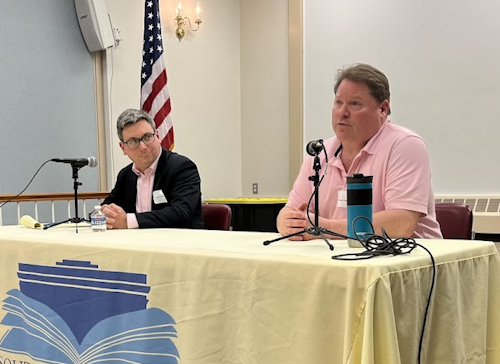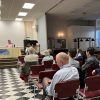Above: The two candidates for one seat on the executive board fielded questions from voters last week. (image cropped from photo by Ryan Donovan)
Last week, Andrew Dennington and Joseph Palmer answered questions from voters and laid out their vision of what the Select Board should be seeking to accomplish.
As the incumbent chair, Dennington told the audience at the Senior Center that his board has made progress that he wants to continue to see through. In contrast, candidate Palmer argued the need for a “sea change”.
The April 25th forum was hosted by the Southborough Library and moderated by Trustee Janet Maney. The video has been posted to Southborough Access Media’s YouTube page (here). (And below are photos shared by Library Director Ryan Donovan.)
Below are my recaps of the candidates’ positions on the issues.
Overall Visions
Neither candidate slung any mud. But Palmer pitched the need for the Select Board to take a different tack on multiple fronts. The undercurrent to most of his answers was a belief that the board should be doing more to inform the public about what Town government is doing and engage them in the decision making.
Palmer didn’t outline a specific plan for improved communication and engagement, but pointed to the public school administration as an example of an entity keeping the community better informed. He also referred to issues that residents should receive texts about.
For his part, Dennington spoke about some of the initiatives that he is involved in that he would like to remain involved in. That included the work looking into the potential regionalization of dispatch services and best staffing levels for the police department. He also noted that he was involved in the selection of the “fairly new” police chief, a new DPW Chief, and a just recruited Fire Chief whose contract should be signed this week. He wanted to continue building on those relationships.
Both candidates spoke about the need for fiscal responsibility in terms of potential big building projects on the horizon, especially the Neary Building project which has implication for the other projects.
In answering a question about their support for a Library building project, Dennington said he supported the Trustees pursuing a state grant and getting more information about what a project would entail and cost. Palmer noted that it also hinges on the ability to clear enough “financial space”, which won’t be possible if we overspend on other projects. He talked about “very big balls in the air” with financial consequences that impact the choices.
Palmer also pointed to a prior Town Meeting vote to use CPC funds to cover the cost of restoring the Library’s facade and roof. That came with a Preservation Restriction (PR). Palmer said the Town Meeting Moderator hadn’t allowed the hall to have a conversation about doing it without the PR and now he doesn’t know what that will cost us when we look at potential library building projects.
That Town Meeting vote was one of multiple examples that Palmer opined show the need to take a different approach at future Town Meetings. For big important decisions, like the Neary Building project, he believes voters should be given multiple options to choose from rather than one Article to vote up and down.
Dennington rebutted that he believes the Select Board’s role is to do the preparatory work and bring a simple choice laid out for voters.
Karen Shimkus asked Palmer for his view on the Select Board’s use of unelected “emissaries” (including ones not elected)* to negotiate on behalf of the Town without the requirement to take minutes. Palmer indicated that negotiations are a tricky area to balance. He agreed with Dennington that it can sometimes be more effective than discussions in public meetings. (They used past PILOT negotiations with private schools as an example they both supported as having been successful.) Palmer said he believes the real issue is public trust which more open communications would improve.
More issues from the Q&A
Affordable Housing & MBTA Zoning
Paul Desmond, a member of SHOPC (Southborough Housing Opportunity Committee) asked about Palmer’s approach to addressing affordable housing given his stated opposition to MBTA zoning.
Desmond referred to the MBTA zoning as intended to create “more housing and more affordable housing, which I think anyone who’s paying attention would agree is necessary not just in Southborough” but across the state and country”. Both candidates clarified that MBTA zoning is to create denser housing but not focused on Affordable Housing. (It doesn’t need to require any affordable component and is very limited in how much it can include as a requirement.)
Palmer pointed out that a main requirement is fitting the zoning into the area near the train where the most affordable neighborhoods exist. Some of the more affordable units could be demolished and replaced by units that don’t have to be affordable.
Dennington advocated taking the Planning Board’s path for the zoning which he described as in areas where “if there’s something that’s going to be built it’s probably not going to be built for some time” to avoid an “enormous surge of new growth right after we build a school”.
Palmer said he believes the Town should be “fighting” the state on the MBTA zoning requirement instead of succumbing. He said it was likely the state would identify that the Town is trying to avoid building and reject the “weird maps”.
He justified by highlighting the potential impact combined with 40Bs currently in application process. He also stressed that the state owns “more than 30%” of the Town and could permit housing on its own land. And he warned that the state could keep revising its regulations to require more and/or require the Town to build sewer to support projects.
Later, Dennington noted that if you “opt out” of the MBTA zoning, you lose a lot of state grants.
As for Affordable Housing, For increasing affordable housing he believes the Town needs to use multiple methods, including the use of some 40Bs “that make sense” (not those that don’t) and streamlining the committee structure to allow “more effective use” of the Town’s Affordable Housing funds. He pitched that it makes more sense to target small, achievable projects than investing in large ambitious ones.
Palmer asserted that it would cost more to build affordable housing than to purchase units from developers and offer it as affordable. Later, he also suggested that existing commercial buildings in towns may make sense for affordable housing, since they have large parking lots to allow for installing septic and more acceptance from neighbors since the buildings already exist.
Regionalizing Dispatch
Asked by Select Board member Al Hamilton about their visions for potential dispatch regionalization, Dennington said that it depended on the result of the staffing study being conducted. If it indicates that regionalizing makes sense, he believed that reentering a partnership with Westborough will probably be the best solution (since the planned site has been relocated).**
Palmer argued against regionalization, pointing to worries about what would happen when residents show up in person at the building looking for help. (The board and chiefs haven’t yet come up with a public plan for how that would be handled.) Palmer said that the answer shouldn’t be a phone on the wall.
He also noted that he didn’t trust that the cost would make sense in the long run, after the initial three years of subsidies.
Attracting Businesses
Tim Fling asked how the candidates would attract businesses to Town. Both noted that the lack of sewage systems in town is a big obstacle.
Palmer said it would be difficult to shut down to install sewer line on Route 9. Dennington indicated that he would like state funding to support installing that infrastructure but believes it is a longshot.
Dennington said he also thinks some zoning changes on Route 9 are probably needed. He believed that effort will likely take 1½ – 2 years to accomplish.
*Shimkus used the example of former Advisory Chair John Butler who has been helping the Select Board negotiate the Hopkinton Water Connection agreement without a need to post agendas and minutes.
**The board had entered an agreement for a partnership but agreed to withdraw after Town Meeting made clear its opposition to a project on a former super-fund site which residents had environmental concerns about. However, it wasn’t the only objections that had been publicly raised.
Updated (5/1/24 11:53 am): The video was replaced to fix an editing issue, which changed the URL. I updated the link.








The video appears to be unavailable.
Thanks for alerting me. You can now watch it here. There was an issue with the original video.
(I pointed out to SAM that a short section was missing from the start of Andrew Dennington’s answer to a question about the library. Apparently, that was based on an edit from when someone entering accidentally bumped the camera. When SAM made the fix, it looks like the original one was deleted and the new video had a different URL.)